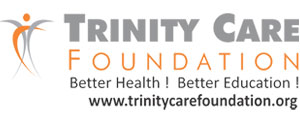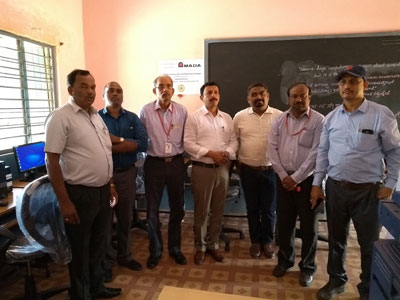
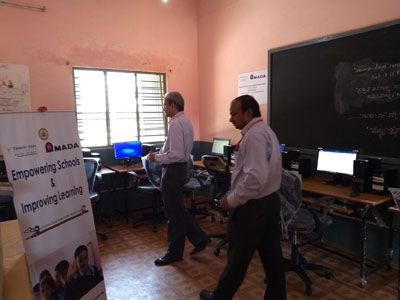
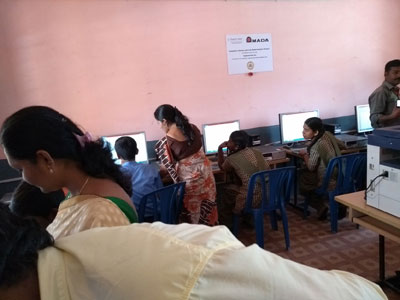
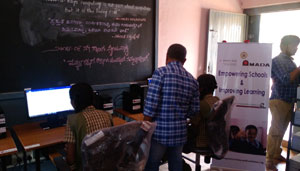
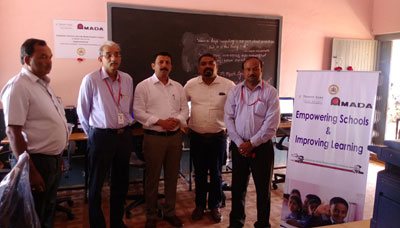
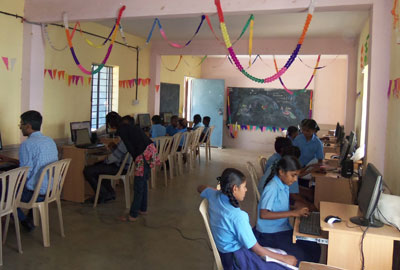
In today’s world, the knowledge of computer software or hardware is a basic necessity for a lot of jobs. By making students from underprivileged sections of the society computer literate will mean making them competent and better suited for today’s job market or pursue higher studies. This will also improve their prospects of getting into a better job. We can therefore safely conclude- lack of basic computer skills can certainly be looked upon as a hindrance to an individual’s development.
It was really unfortunate to see these well-deserving students from Govt. schools not having a basic idea of computers, simply because they have never used computers. Though we could encourage every student to get some basic computer knowledge to at least keep in touch, this is far from reality as govt. schools do not have adequate C-lab facilities. Earlier the younger ones get familiar with computers, the better it will be for them to find out what lies out there.
Project Name/Title:
Basic Computer Literacy Program for underprivileged Govt. school students in Bangalore, Karnataka.
Project Summary:
To set-up a computer lab at Govt. Schools and enable computer usage/application exposure to underprivileged students in order to improve their skillset & employability. To equip the teachers of Govt. Schools with the basic skills in the application of computer programs and software are in implementing computer-assisted instruction across subjects and teachers act as facilitators of learning.
Project Description:
Computer education is a part of the school curriculum in nearly all the private schools, however, a lot of government, semi-government educational institutions in our country are still deprived of quality computer education.
There are many reasons, unavailability of working and well-maintained computer lab continues to remain one of the foremost reasons. Quality teaching resource is also another challenge faced by many Govt. run institutions, the use of Information and Technology in the medium of instruction will help develop learners to be empowered in a rapidly changing world, we know that the use of computers and educational software’s in teaching has a significant impact in student’s learning outcomes.
An answer to the pertinent question of, why do they need a computer lab at the Govt. schools? In today’s world, knowledge of computers is a basic necessity. By assisting students and making them computer literate will mean making them competent and better suited for today’s learning environment. This also improves their prospects of a better career option, lack of basic computer skills can certainly be looked upon as a hindrance to an individual’s academic development. Then, is computer literacy so important? If put to right use, the computers can provide rich content that can help the students learn subjects, new techniques, get more information about various subjects, understand and apply the knowledge gained to improve overall performance standard.
Computers can make the process of learning interesting as well as knowledge-rich. It can attract the students to learn progressively, resulting in more individuals having multiple options of going towards higher education, computers create opportunities for them in today’s job market by enhancing the quality of education being given to them.
Project Objective:
Improve students competencies through School Computer Education sessions focusing on Basic Computer Literacy. To provide basic knowledge of using computers to students who come from rural and economically weaker sections of the society, thereby enhancing the overall quality of education by providing adequate resources, including quality teaching staff and materials.
Specific Objectives:
- To identify and build a safe environment for a computer lab within the school premises.
- To enhance the learning levels of the students in curricular subjects through computer-aided education using multimedia software CDs.
- To appoint a part-time computer teacher.
- To roll out computer basics classes, including them in curriculum and provide educational materials.
- Regular audits & interventions to check the effectiveness of the computer literacy initiative.
- Train teachers including the non-teaching staff the basic computer operations using Microsoft’s eLearning Productivity Programs.
- Update the teachers on new trends in teaching using computer programs and software.
- Regular audits & interventions to check the effectiveness of the initiative.
Additional Objectives:
- To enhance the learning levels of the students in curricular subjects through computer-aided education using multimedia software CDs.
- To introduce students to the world of opportunities, computers have to offer in addition to computer education, students learn Mathematics, Science, Social Science and English subjects through CD ROMs.
- Students are given hands-on experience in the communications media of e-mail and internet facilities.
- Students have the option of learning through either English or Kannada medium.
- Four periods are to be set apart a week for computer and computer-aided education.
Geographic Location:
Bengaluru (Urban & Rural)Karnataka,India.(can be implemented in other Districts of the state)
Collaborating Organization:
(Project sponsors) and Trinity Care Foundation (project implementing NGO/agency)
CSR Partnership
To help meet your corporate social responsibility (CSR) goals, Trinity Care Foundation (TCF) can create specific project proposals for your organisation. We can manage and implement your CSR Projects, please get in touch with Mr.Binu Varghese/+91-9880358888 or Dr. Thomas/+91-9880396666 at support@trinitycarefoundation.org.
For more information about CSR Projects : Please leave your details:
One of our TCF team member will be happy to get in touch with you.
